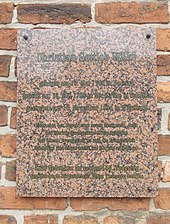Christian Gottlob Wilke
Christian Gottlob Wilke (born May 13, 1788 in Badrina near Delitzsch , † November 10, 1854 in Würzburg ; also Christian Gottlieb Wilke ) was a German theologian.
Life
Wilkes' baptism entry is in the parish register of the church in Lindenhayn, his father was a catechist and later worked as such in Werben bei Pegau .
Wilke was baptized and raised as a Protestant, and after attending grammar school in Zeitz, he studied philosophy and theology in Leipzig. In 1814 he became a field preacher in the Saxon Landwehr, later a pastor in Hermannsdorf in the Ore Mountains. In 1838 he settled in Dresden, where in the same year he published his work Der Urvangelist or the exegetically critical study of the relationship between the first three Gospels . In this work he claimed that the evangelist Mark was the "original evangelist" and served as the source for the gospels of Matthew and Luke (Wilke hypothesis, synoptic problem ). During the same period, the philosopher Christian Hermann Weisse , who was independent from Wilke, came to the same conclusion. From 1838 he worked in Dresden on his dictionary of the New Testament, among other things.
In 1846 Wilke converted to the Catholic faith with his wife. He received his doctorate in Freiburg. In Würzburg he revised his two main works ( Clavis Novi Testamenti philologica and Lexicon ) from a Catholic perspective.
Works
- The original evangelist, or exegetical-critical examination of the relationship between the first three Gospels, Dresden / Leipzig 1838
- The New Testament rhetoric: a side piece on the grammar of the New Testament language idiom - Dresden (etc.): Arnold, 1843.
- The three-headed snake that stings after the church: a serious warning to the friends and enemies of the church with regard to the vote of Mr. KG Bretschneider in Gotha. Leipzig: Jackowitz, 1845.
- The question: Can a Protestant Christian convert to the Roman Catholic Church with a clear conscience? : Answered frankly and conscientiously by a Protestant theologian [d. i. Christian Gottlob Wilke]. Regensburg: Manz, 1845.
- Instructions for interpreting and explaining the writings of the New Testament, etc. Dresden & Leipzig, 1845.
- Clavis Novi Testamenti philologica: usibus scholarum et iuvenum theologiae studiosorum accommodata. Dresden 1841 (Arnold), 2 vol., Vol. 1: XXII, 662 p., Vol. 2: 651 p .; 2nd ed. 1850, at Internet Archive
- Biblical hermeneutics: after cath. Principles in strict systemat. Zshg. U. under consideration. d. newest. approved hermeneut. Textbook. esp. d. Lib. I. II.; De interpretatione scriptur sacr. of the Francisc. Xaver. Patritius, ed. Romae 1844. Würzburg: Stahel, 1853
- Lexicon graeco-latinum in libros Novi Testamenti: usibus scholarum et iuvenum s. theologiae catholicae studiosorum accommodatum. Regensburg 1858 (Manz), ed. Valentin Loch, VIII, 858 p., At Bayerische StaatsBibliothek digital
literature
- David August Rosenthal: Images of Converts from the 19th Century , Volume I, 2 (3rd edition 1892, pp. 338–345), Hurter'sche Buchhandlung, Schaffhausen.
- Karl Werner: History of Catholic Theology , Verlag Cotta, Munich, 1866, p. 537 f full text at Google Books.
- Julius Wellhausen: Gospel Commentaries (new edition from 1904), Verlag Walter de Gruyter, Berlin, 1987, ISBN 3110100657 , 9783110100655, in particular § 3. Mark. P. 34f on Wilke full text on Google Books.
- Further selection from the pastor's book , section Saxony .
- Friedrich Lauchert : Wilke, Christian Gottlob . In: Allgemeine Deutsche Biographie (ADB). Volume 43, Duncker & Humblot, Leipzig 1898, p. 235 f.
Web links
- http://www.richardwolf.de/latein/wilke.htm
- about Wilke in Kreyssig's album of the Evangelical Lutheran clergy ... Excerpt from Google Books
Individual evidence
- ^ Date of death Würzburg in Manfred Brandl: The German Catholic Theologians of Modern Times , p. 825 excerpt from Google Books
- ↑ but always "Gottlob" in the address books Dresden 1838 and Würzburg 1852 as well as in the works -Weblinks
- ↑ to Parochie Werben (p. 400–403) in Kirchen- u. School Chronicle , on Google Books
- ↑ Johann Gottlob Wilke mentioned there on p. 403 could be Wilke's father
- ^ On January 17, 1829 the cantor Johann Gottlob Wilke died in Werben bei Pegau, see New Nekrolog der Deutschen (Volume 7/1831), p. 906 at Google Books
- ↑ see Theological Studies and Reviews (1917), p. 199 (2 excerpts) at Google Books: year of birth 1788 Badrina and correction of year of birth 1786 "Werm"
- ↑ Wife see p. 825 in "The German Catholic Theologians of Modern Times"
- ↑ residing at Reuerergasse 206 (IV.) Adressbuch (1852) p. 285 at Google Books
- ↑ on the year and place of birth mentioned there, see footnote Theological Studies and Critics (1917), p. 199 (2 excerpts) at Google Books
- ↑ on the year and place of birth mentioned there, see footnote Theological Studies and Critics (1917), p. 199 (2 excerpts) at Google Books
| personal data | |
|---|---|
| SURNAME | Wilke, Christian Gottlob |
| ALTERNATIVE NAMES | Wilke, Christian Gottlieb |
| BRIEF DESCRIPTION | German theologian |
| DATE OF BIRTH | May 13, 1788 |
| PLACE OF BIRTH | Badrina at Delitzsch |
| DATE OF DEATH | November 10, 1854 |
| Place of death | Wurzburg |
